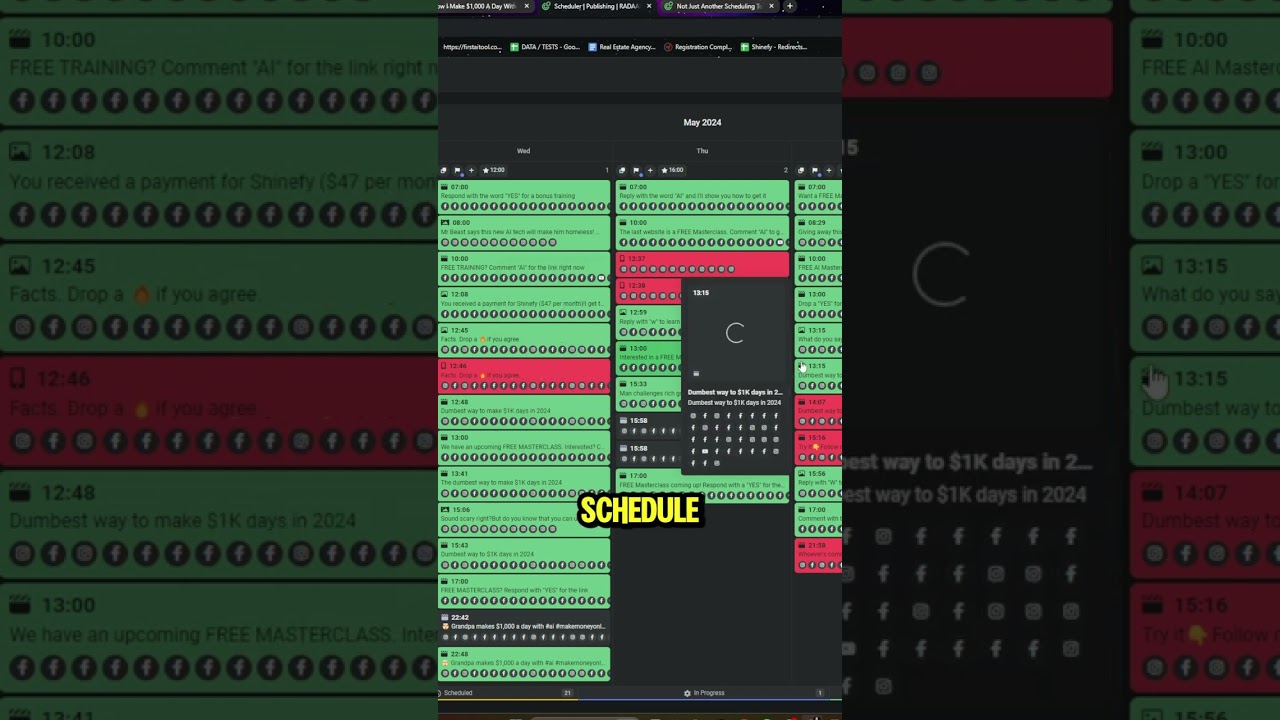These Five Websites Feel Illegal to Know
You won’t believe what I just stumbled upon! I’ve discovered these five websites that feel like they should be illegal to know. In an eye-catching video by Shinefy, they reveal the secret to making $4,000 a week for free. All you have to do is follow three simple steps: 1) Follow, 2) Comment with “Website”, 3) DM with “Website”. And bam, you’re on your way to earning big bucks!
Now, let me tell you about these five mysterious websites. First up is Shiny.com, a tool that lets you generate AI videos. Then, there’s AISchedulingTool.com, which uses AI to schedule out your content on social media. ScaryToolbox.com offers a free checklist of hundreds of AI tools that you could get paid to promote. And finally, GoTool.com provides a free training that teaches you how to earn money with AI. If you’re interested, reply with “yes” and I’ll send you the last website that feels like an illegal secret. Trust me, you don’t want to miss out on this exciting opportunity!
Shiny.comom

Description of Shiny.comom
Shiny.comom is a website that offers an AI video generation tool. This tool allows users to easily create and generate videos using artificial intelligence technology. With just a few simple steps, users can input their content, choose a template, and let the AI algorithm do the rest. The platform provides a user-friendly interface, making it accessible to individuals with little to no video editing experience. Whether you’re looking to create promotional videos, social media content, or even personal projects, Shiny.comom offers a convenient and efficient solution.
Outline of its AI video generation tool
The AI video generation tool on Shiny.comom utilizes advanced machine learning algorithms to analyze and process the content provided by users. It is capable of transforming raw materials, such as text, images, and audio, into professionally edited videos. The tool automatically selects relevant visuals, applies appropriate transitions and effects, and adds background music to enhance the overall production value. Users can further customize their videos by adjusting settings, rearranging content, and adding text overlays. The AI aspect of the tool allows for quick and efficient video creation, saving users valuable time and effort.
Potential legal concerns or gray areas
While Shiny.comom’s AI video generation tool is undoubtedly innovative and convenient, there are potential legal concerns and gray areas to consider. One primary concern is copyright infringement. The tool relies on users providing content, which could include copyrighted material without proper permission or licensing. Shiny.comom should have measures in place to ensure users are aware of and respect copyright laws when using their platform. Additionally, there may be privacy concerns if users input personal or sensitive information, as the AI algorithms could potentially store or utilize that data in unintended ways. Transparency and clear communication regarding data usage and privacy policy are crucial to maintain user trust and comply with legal requirements.
AI Scheduling Tool.com
Overview of AI Scheduling Tool.com
AI Scheduling Tool.com is a platform that leverages artificial intelligence to simplify and optimize content scheduling on social media and other digital platforms. With its robust AI capabilities, users can automate the process of determining the optimal timing and frequency for posting their content, ensuring maximum reach and engagement. The platform offers seamless integration with various social media channels, allowing users to manage multiple accounts and schedules from a single dashboard. By utilizing AI algorithms to analyze user behavior patterns, AI Scheduling Tool.com helps users strategically plan and distribute their content for optimal performance.
Explanation of its AI scheduling capabilities
AI Scheduling Tool.com’s AI scheduling capabilities enable users to optimize their social media presence by automating the scheduling of content. The AI algorithms analyze historical data, user engagement patterns, and other relevant factors to determine the best times to post content for maximum visibility and audience responsiveness. The platform also takes into account specific user preferences and goals, allowing for customization and fine-tuning of scheduling parameters. By automating this process, AI Scheduling Tool.com frees up valuable time for users to focus on creating high-quality content and engaging with their audience.
Discussion on potential ethical/legal concerns
While AI Scheduling Tool.com offers a valuable service, there are potential ethical and legal concerns to consider. One concern is the potential for artificial manipulation of user behavior. By strategically scheduling content based on AI algorithms, there is a risk of influencing user engagement and behavior in ways that may not align with their genuine preferences. This raises questions about user autonomy and the potential for unethical or manipulative practices. Additionally, the automated scheduling of content could lead to unintended consequences, such as insincere or repetitive posts that may negatively impact user experience and lead to spam-like behavior. Adequate transparency, user control, and clear guidelines are essential to ensure ethical usage of AI scheduling tools.
Scary Toolbox.com
Introduction to Scary Toolbox.com
Scary Toolbox.com is a website that offers a free collection of checklists featuring various AI tools. These tools encompass a wide range of applications and functionalities, suitable for professionals and enthusiasts alike. Scary Toolbox.com aims to provide users with a comprehensive resource to explore and discover AI tools that can enhance their work productivity, creativity, and problem-solving abilities.
Explanation of its free checklist of AI tools
Scary Toolbox.com’s free checklist contains an extensive compilation of AI tools, each accompanied by a brief description and links to further information or downloads. The checklist covers diverse categories, such as image recognition, natural language processing, data analysis, and more. Users can peruse the checklist to find tools relevant to their specific needs or interests. Whether you’re a marketer, developer, researcher, or simply curious about the possibilities of AI, Scary Toolbox.com’s checklist offers a convenient starting point for discovering and exploring various AI tools.
Opinions on the use of these AI tools for promotion
The use of AI tools for promotion can be both beneficial and potentially questionable, depending on the context and implementation. Utilizing AI tools to enhance marketing strategies and improve business performance is a common practice in today’s digital landscape. However, caution must be exercised to ensure that the use of AI tools aligns with ethical standards and respects user privacy. AI-powered promotional tactics should prioritize transparency, fairness, and genuine value for the target audience. It is essential for businesses and marketers to remain aware of the potential ethical implications and legal considerations when utilizing AI tools for promotional purposes.
Discussion on any legal implications
Using AI tools for promotion raises legal implications related to advertising regulations, data protection, and intellectual property rights. AI-powered promotional activities must comply with relevant advertising laws and regulations, ensuring that content is truthful, not misleading, and does not infringe upon competitors’ rights. Additionally, the collection and processing of user data by AI tools must align with applicable data protection laws and regulations, such as obtaining proper consent and safeguarding user privacy. Intellectual property rights also come into play, as the use of AI tools may involve copyright or trademark issues. These legal considerations remind businesses to approach AI tools for promotion with diligence and compliance.
Go tool.com
Overview of Go tool.com
Go tool.com is a website that offers free training on how to earn money with AI. This platform aims to help individuals explore and utilize the potential income-generating opportunities that AI technologies present. By providing comprehensive training materials, Go tool.com equips users with the knowledge and skills necessary to embark on AI-related ventures and monetize their expertise in the field.
Explanation of its free training on earning money with AI
Go tool.com’s free training program covers various aspects of earning money with AI. It provides insights into identifying profitable niches, understanding AI algorithms and models, developing AI-based products or services, and effectively marketing and selling AI solutions. The training materials may consist of video tutorials, written guides, case studies, and practical exercises. Through this training, users can gain a comprehensive understanding of the AI industry’s potential opportunities and learn the necessary skills to capitalize on them.
Discussion on the legitimacy of these earning methods
While Go tool.com’s training program may offer valuable insights and knowledge, it is essential to approach the subject of earning money with AI with caution. The legitimacy of earning methods depends on various factors, including the user’s skills, the demand for AI-related products or services, and the ethical considerations associated with specific income-generating activities. Users should critically evaluate and validate the training materials and consider factors such as market viability, competition, and societal impact before pursuing AI-based income opportunities. Additionally, users should be mindful of potential scams or misleading promises that exploit the allure of AI technology for financial gain.
Unknown Website
The mysterious fifth website
The mention of an unknown website in the video adds an intriguing element to the discussion. The video teases the potential illegality of this mysterious website, piquing curiosity and leaving viewers eager to know more. However, without further information or engagement, the identity and nature of this fifth website remain undisclosed.
Teasing the potential illegality of the website
By hinting at the potential illegality of the unknown website, the video creates a sense of excitement and intrigue. It taps into the natural curiosity of viewers, compelling them to seek more information or engage with the content for a chance to unveil the enigmatic website. This teasing approach plays on the human desire for exclusive or forbidden knowledge, generating interest and driving audience engagement.
Requesting engagement to reveal the website
The video encourages viewers to respond and engage by requesting users to reply with “yes” in order to receive the last website that feels illegal to know. This call to action aims to elicit user participation and encourage viewers to take action by expressing their interest. By promoting engagement, the video aims to foster a sense of community and active involvement, ultimately driving more viewers to the platform or channel.
Analysis of Potential Illegality
Evaluation of features that make these websites feel illegal
The websites discussed in the video seem to be associated with potential illegality due to certain features or claims made. These features may include promises of quick and substantial financial gains, methods that exploit legal loopholes, potentially infringing on copyright or intellectual property rights, or engaging in practices that manipulate user behavior. While the video does not provide in-depth analysis of each website, these features or claims can contribute to the perception of illegality.
Identification of legal gray areas or ethical concerns
Beyond the perception of illegality, these websites may also operate in legal gray areas or raise ethical concerns. The use of AI technology in various contexts poses challenges regarding privacy, data protection, and potential biases. Privacy concerns may arise if user data is collected and processed without proper consent or used in ways that compromise user privacy. Additionally, the potential for AI algorithms to reinforce biases or manipulate user behavior raises ethical concerns regarding fairness and transparency.
Discussion on the line between legality and perceived legality
The line between legality and perceived legality can be blurred when it comes to innovative technologies like AI. While these websites may not necessarily engage in explicitly illegal activities, they may utilize tactics or make claims that push the boundaries of what is considered acceptable or ethical. It is crucial to critically evaluate the practices, claims, and potential implications of these websites to navigate the fine line between legality and perceived legality effectively.
Ethical and Legal Implications
Exploration of the ethical implications of using these websites
Using these websites raises ethical implications that revolve around issues such as privacy, fairness, transparency, and user autonomy. The AI-powered tools offered by these websites may collect and process user data, which raises concerns about the protection of individual privacy. Additionally, the use of AI algorithms to influence user behavior through promotional tactics may raise questions about fairness and transparency in marketing practices. It is crucial to consider these ethical implications to maintain trust, integrity, and respect for user rights.
Discussion on potential legal consequences for users and creators
Users and creators utilizing these websites need to be aware of potential legal consequences that could arise from their actions. Engaging in activities that infringe upon copyright laws, manipulate user behavior, or violate advertising regulations could lead to legal ramifications such as cease-and-desist letters, fines, litigation, or damage to one’s reputation. Both users and creators should familiarize themselves with applicable laws and regulations to mitigate potential legal risks associated with the use of AI tools or participation in questionable activities.
Consideration of the responsibility of website owners
Website owners hold a significant responsibility in ensuring the ethical and legal use of their platforms and tools. They should provide clear guidelines, terms of service, and privacy policies to users, outlining the boundaries, limitations, and obligations associated with using their websites and tools. Regular monitoring and enforcement of ethical and legal standards should be implemented to maintain the integrity of the platform and protect both users and creators. Open communication channels for reporting violations or seeking clarifications are crucial for fostering a culture of ethical and responsible AI usage.
User Experiences and Opinions
Collection of user experiences with these websites
User experiences with these websites may vary widely depending on various factors such as individual goals, expectations, and interactions with the platform. Some users may find value in the features and functionalities offered by these websites, while others may encounter issues or frustrations. Collecting and analyzing user experiences provides valuable insights into the effectiveness, usability, and ethical implications of these AI-powered platforms. User feedback can highlight areas of improvement and contribute to ongoing discussions regarding the legitimacy and ethicality of these websites.
Sharing of opinions on the legitimacy and ethicality of the websites
Opinions on the legitimacy and ethicality of these websites will inevitably differ among individuals and stakeholders. It is essential to foster an open dialogue to encourage diverse perspectives and engage in meaningful discussions. Through sharing opinions and engaging in thoughtful debates, a deeper understanding of the complex issues surrounding these websites can be achieved. This exchange of views and perspectives can contribute to ongoing efforts to establish ethical guidelines and legal frameworks for AI applications.
Debate on the fine line between legality and perceived legality
The fine line between legality and perceived legality is a subject for debate and scrutiny. Engaging in these websites raises questions about where the boundaries lie and how perceptions of legality can influence user behavior and societal norms. Thoughtful debate on this topic fosters critical thinking and helps refine our understanding of how emerging technologies like AI are shaped by both legal frameworks and public attitudes. By exploring and challenging this line, we can establish clearer guidelines and ethical standards for the responsible use of AI technology.
Regulatory Efforts and Response
Overview of existing regulations related to AI and online platforms
Various regulatory efforts exist to address the legal and ethical concerns associated with AI and online platforms. These include laws and regulations pertaining to data protection, privacy, intellectual property, consumer protection, and advertising practices. Additionally, regulatory bodies and industry organizations may provide guidelines or best practices to promote responsible AI development and usage. These regulations and guidelines aim to strike a balance between fostering innovation and safeguarding the rights and well-being of individuals and society as a whole.
Discussion on the effectiveness of current regulations
The effectiveness of current regulations in addressing the legal and ethical implications of AI and online platforms remains a topic of discussion. With the rapid pace of technological advancements, regulations may struggle to keep up with emerging challenges and complexities. Gaps in existing regulations or difficulties in enforcement may hinder their effectiveness. Evaluating the effectiveness of current regulations allows for critical reflection and the identification of areas that require further attention and improvement.
Proposals or suggestions for improved regulation and oversight
To address the legal and ethical concerns associated with these websites and AI technologies in general, proposals for improved regulation and oversight can be considered. These proposals may include stricter enforcement of existing regulations, the development of specific AI-related legislation, enhanced transparency requirements for AI-powered platforms, and promoting interdisciplinary collaboration between policymakers, industry experts, and ethicists. Robust regulation and oversight can support responsible AI development and usage while ensuring the protection of user rights and ethical considerations.
Conclusion
Recap of the five websites discussed
In this comprehensive article, we explored five websites: Shiny.comom, AI Scheduling Tool.com, Scary Toolbox.com, Go tool.com, and an unknown website. We examined their features, functionalities, potential legal concerns, and ethical implications.
Summary of the key legal and ethical concerns
Throughout this analysis, we identified legal concerns such as copyright infringement, potential privacy issues, advertising regulation compliance, and intellectual property rights infringement. Ethical considerations included user autonomy, transparency, fairness, and potential biases in AI algorithms.
Final thoughts on the perceived illegality of these websites
The perceived illegality of these websites stems from certain features, claims, or associated practices that may push the boundaries of legality or ethical standards. However, it is essential to consider the nuances and complexities surrounding AI technologies and related platforms. Engaging in thoughtful debates, exploring improved regulation and oversight, and establishing ethical guidelines are vital steps in navigating the evolving landscape of AI and ensuring responsible and ethical usage.
These Five Websites Feel Illegal to Know
Want to know the secret on how I make $4,000 a week for free? 💸
Just do these 3 steps:
-
Follow
-
Comment with “Website”
-
DM with “Website”





